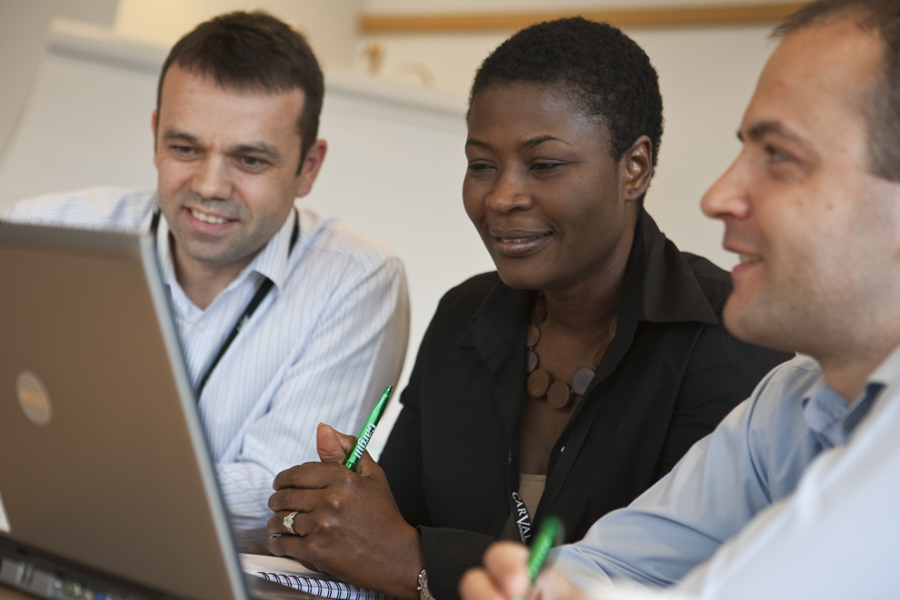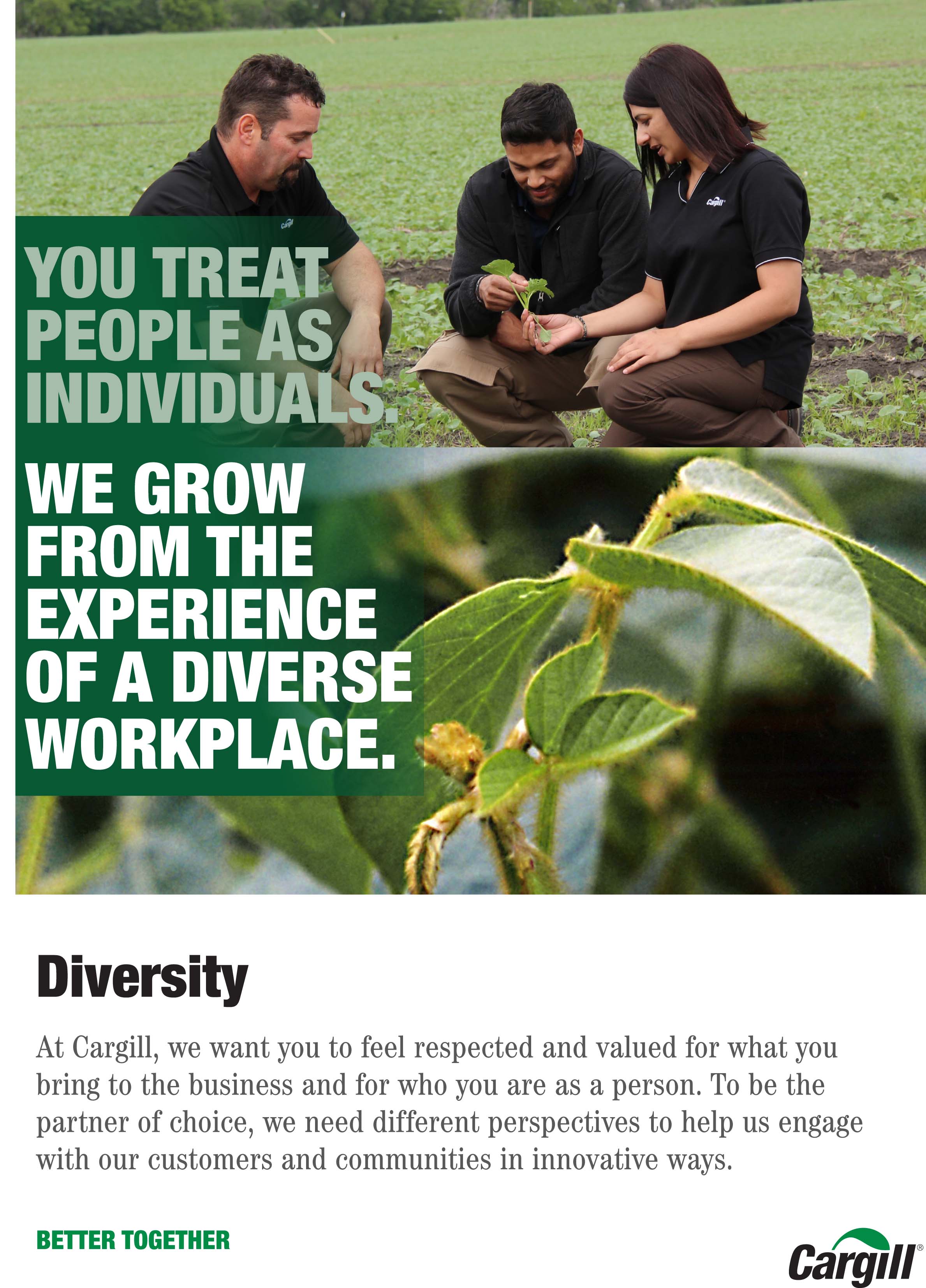" On the route to inclusion … "
An interview by Alessandra Zocca
|
|
|
Maija Van Langendonck, Director
Cargill Global Diversity & Inclusion
|
PWI –
Maija, could you please introduce Cargill? What does Global Diversity & Inclusion mean at Cargill?
Cargill is quite a unique company: a large international organization, employing 139,000 people in 65 countries. Cargill has a highly diversified business - international producer and marketer of food, agricultural, financial and industrial products and services. Cargill was founded in 1865 in Minneapolis (Minnesota) where the headquarters are located and is a privately held company - family owned - with a unique and informal culture.
Cargill was established in Belgium via a grain importing office in Antwerp in 1953. We now have over 1,000 employees in nine locations: Antwerp (two locations), Izegem, Gent, Herent, Vilvoorde, Mechelen, Mouscron and Villers-le-Bouillet. The company has a number of different and diverse operations in the country, including the production of food ingredients and the processing, distribution and trading of a variety of agricultural products. Cargill’s European Headquarters for its food businesses and Cargill's R&D Centre Europe, Cargill’s primary technical centre serving Europe, the Middle East and Africa are also located in Belgium (Mechelen).
I believe we define Diversity in a way that’s not that different from many other organizations. We believe that it is all the ways in which people are different, whether culture, experience, religion, gender, generations, tenure etc . And we encourage people to consider this as very broad. However, at Cargill we put a lot more emphasis on inclusion, which is about creating an environment and a culture where differences are capitalized on and all employees feel they can bring their full self to work. In fact, talking about diversity is, in a way, highlighting it – this could potentially lead to segmentation versus harnessing.
At Cargill we approach Inclusion from a broader perspective: we want to create a culture where there is a genuine interest and respect in the other’s perspective and background.

A culture where
differences don’t divide, but rather unite to achieve high performance and a better, more interesting work experience. Therefore, it is important that all of our employees:
- Feel valued and respected regardless of gender, race, nationality, religion, sexual orientation, gender identity, gender expression, and politics as well as personal, work or communication style
- Have an opportunity to share their ideas and perspectives.
Inclusion is also the natural consequence of our company valuing “integrity”. Ethical behavior is so ingrained in our culture that employees associate Cargill most with integrity. Integrity is one of the characteristics we have identified as key attribute of our employees, which we look for and expect in everyone.
PWI – What triggered Cargill to create this function, what business advantages do diversity and inclusion provide Cargill?
|
Cargill wants to be an employer of choice, Alessandra. For Cargill, this means attracting, selecting, developing, engaging and retaining diverse talent in order to enable our businesses and functions to achieve their strategic goals.
Each employee’s unique talents, perspectives and life experiences are critical to our success, which is why we celebrate individual differences at our company.
We see diversity and inclusion as a source of strength, because our differences broaden our experience, further our competitive strengths, advance customer solutions and drive innovation.
In addition diversity makes the workplace more dynamic, interesting and rewarding for everyone.
|
“Great decisions come from great debates, and great debates are shaped by people that bring a variety of perspectives … Having the diversity that’s necessary for the quality of debate to be at the highest possible level is clearly a business imperative.”
Greg Page – Chairman and CEO
|
PWI – Where is the D&I organizationally positioned within the company structure? What is your role?

Like with many companies based out of the US – historically the DI function was created in response to legal requirements and the DI activities were mainly US centric. We have seen various evolutions since that time from it being more compliance driven to being a business imperative and from being initially US centric to being a global focus and opportunity. Critical in this is that we recognize that the needs and opportunities in each business and location can be very different. However, the overall objective of inclusion remains the same; that the “what” will not change but the “how” we approach it may.
From a structural perspective, we have also seen changes. Where originally this department reported directly into the CEO, we are now part of the HR Talent COE (Centre of Expertise). This is very much a DI maturity evolution, as the DI journey evolves the need for partnerships may differ. With an initial emphasis on strong positioning in the organization, our focus is now on integrating DI into the organization’s processes and structures.
My role is primarily a global role, I operate as a senior DI advisor to the businesses and functions and help them to integrate a Diversity and Inclusion focus and opportunities into their strategy and business plan. Together we will look at where the opportunities lie within their organization, whether it is an awareness project, a new organizational design, talent strategy, focus on on-boarding or leveraging diverse employees for our growth strategies. Additionally, I am accountable for staying informed about the developments and best practices in Europe, the diversity legislation and identifying potential partners for our DI projects.
PWI – What are the reactions of female and male employees to the actions put in place?
At the beginning employees thought it was a too US or gender focused now that we have spent more time making Diversity and Inclusion more globally relevant, a lot more people recognize the value to them and the organization. We start seeing more employees state that they really appreciate the efforts that Cargill is making in this space. A leader in Cargill just recently shared this with me: “The concept of DI is so integrated with the core values of Cargill and our heart of leadership that our challenge is just to remove the barriers.” He then went on to share how DI showed up in his business and how some parts had always been part of how they operated.
As mentioned above, the key is to recognize that not all initiatives are relevant to all regions. For example, in some countries child care is not a barrier for women, but it could be elder care, or travelling in countries where women have cultural travel restrictions.
Then employees’ attitude became more supportive, they recognize inclusion actions as a high engagement factor, like the “global flexibility policy” which allows them to work from home and/or part-time unless over-ruled by local legislations.
PWI - What do you think about quotas? How do you think women's equal participation in the boardroom can be achieved?
The quota topic is a hot discussion in many companies doing work on Diversity & Inclusion, especially around gender. For us at Cargill, gender equality is one of many diversity factors, like African Americans in the US, local talent in emerging markets , disability or age (+50) for instance that will help us be a successful business player. However, at Cargill, we refer to the language of goals and not quotas. It is important to understand that goals (including numerical ones) are voluntary – and as they are not mandated, they are not a quota and do not create quotas for specific groups. Goals reflect a good faith effort being made to reach a target hiring number of qualified women and minorities through a Diversity & Inclusion Program. As such, our goals at Cargill are set to make progress toward eliminating the gap between the availability of women or minorities in the labor market and representation in the workforce, including at the board level. For many, getting the numbers up is one thing, but for us, getting the “right” numbers up ,in the appropriate organisational culture for the right reasons is much more important . Goals for us are a way to ensure that we reach out to the broadest talent pool and then hire the best candidate. We are very clear about meritocracy and focus on qualified candidates being an integral part of how we “do” Diversity & Inclusion. It’s about being a business enabler and not a numbers’ game.
PWI - Maija, would you like to tell us about the evolution you see of the overall diversity (gender, age, culture) management in leading companies?
I would like to make a remark about an issue that is fundamental in my opinion: the evolution of inclusion depends heavily on the neutrality of HR processes. All the recruitment, evaluation, promotion, development and rewarding processes must be inclusive and not designed around target profiles which do not take into account diversity. Let’s take “merit” for example, if it is measured with characteristics belonging to a certain geographical culture, then people from different cultures could be penalized.
You know, Alessandra, my ambition is that we do not need to talk about diversity any longer and that diversity and inclusion becomes a trait of next generation leadership.
| Short Biography |
Maija Van Langendonck is one of the Global Diversity and Inclusion leads for Cargill. a Minneapolis based Global Company. Maija is based out of Belgium but works with Cargill businesses across the globe. In this role she advises and supports the businesses in the development and execution of their Diversity and Inclusion Strategy. Using best practices and thought leadership to translate Diversity and Inclusion objectives into ongoing business and people processes. Through this we work towards creating an inclusive culture and making Cargill an employer of choice.
Before joining Cargill in January of 2011 – Maija was the HR Director at Nato C3 Agency – one of the largest NATO agencies specializing in providing NATO authorities with Consultation, Command and Control capabilities. Whilst at NC3A Maija initiated and led a major change initiative focusing on changing the organizational structure and culture to support the needs of its stakeholders. This initiative included the introduction of competencies – use of assessment centres, a redesign of the performance management process, implementation of an integrated HR system and the design & delivery of a customized leadership development track.
In addition to more than 10 years experience in various senior roles within the HR domain, Maija has worked several years in commercial roles providing her with good business acumen as well as consulting skills. Her professional career with various International Organizations, across an array of different industries, has not only provided Maija with valuable industry insights - it has also allowed her to travel extensively.
Maija is passionate about leveraging all opportunities that life offers us and use these to create a work environment where all people feel they can contribute and are recognized for their unique talents.
Maija Van Langendonck
Director, Cargill Global Diversity & Inclusion
Cargill Europe bvba
Bedrijvenlaan 9
B-2800 Mechelen
Belgium
Phone: +32 (0) 15 458 303
|
| Want to learn more about Cargill’s corporate responsibility, food security and work ethics? Go to:http://www.cargill.com/corporate-responsibility/our-commitments/index.jsp |
.png)
.png)